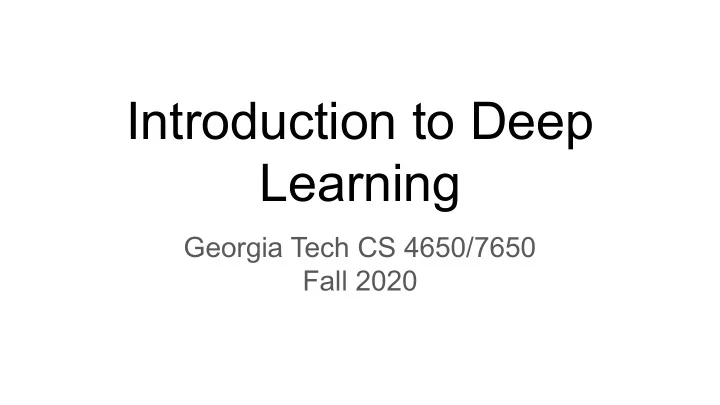

Introduction to Deep Learning Georgia Tech CS 4650/7650 Fall 2020
Outline ● Deep Learning ○ CNN ○ RNN ○ Attention ○ Transformer ● Pytorch ○ Introduction ○ Basics ○ Examples
CNNs Some slides borrowed from Fei-Fei Li & Justin Johnson & Serena Yeung at Stanford.
Fully Connected Layer Input 32x32x3 image Flattened image Output Weight Matrix 32*32*3 = 3072
Convolutional Layer Input Convolve the filter with the image i.e. 32x32x3 image “slide over the image spatially, computing dot products” Filter 5x5x3 Filters always extend the full depth of the input volume.
Convolutional Layer At each step during the convolution, the filter acts on a region in the input image and results in a single number as output. This number is the result of the dot product between the values in the filter and the values in the 5x5x3 chunk in the image that the filter acts on. Combining these together for the entire image results in the activation map.
Convolutional Layer Filters can be stacked together. Example- If we had 6 filters of shape 5x5, each would produce an activation map of 28x28x1 and our output would be a “new image” of shape 28x28x6.
Convolutional Layer Visualizations borrowed from Irhum Shafkat’s blog.
Convolutional Layer Convolution Convolution Standard with Padding with strides Convolution Visualizations borrowed from vdumoulin’s github repo.
Convolutional Layer Output Size: (N - F)/stride + 1 e.g. N = 7, F = 3, stride 1 => (7 - 3)/1 + 1 = 5 e.g. N = 7, F = 3, stride 2 => (7 - 3)/2 + 1 = 3
Pooling Layer ● makes the representations smaller and more manageable ● operates over each activation map independently
Max Pooling
ConvNet Layer Image credits- Saha’s blog.
Application in text ● NLP doesn’t use convolutional nets a lot ● Some adjacent applications exist, such as graph convolutions or image-to-text ● For text sequences, it sometimes helps to use 1-dimensional convolutions (because embedding dimension ordering has no intrinsic meaning) ● What does this basically amount to? ● N-gram features.
RNNs Some slides borrowed from Fei-Fei Li & Justin Johnson & Serena Yeung at Stanford.
Vanilla Neural Networks House Price Prediction Output Input Hidden Layers Hidden Layers Output Input
How to model sequences? ● Text Classification: Input Sequence → Output label ● Translation: Input Sequence → Output Sequence ● Image Captioning: Input image → Output Sequence
RNN - Recurrent Neural Networks Vanilla e.g. e.g. e.g. e.g. Neural Image captioning Text classification Translation POS tagging Networks
RNN - Representation Output Vector Hidden state fed back into the RNN cell Input Vector
RNN - Recurrence Relation The RNN cell consists of a hidden state that is updated whenever a new input is received. At every time step, Output Vector this hidden state is fed back into the RNN cell. Hidden state fed back into the RNN cell Input Vector
RNN - Rolled out representation
RNN - Rolled out representation Individual Losses L i Same Weight matrix- W
RNN - Backpropagation Through Time Forward pass through entire sequence to produce intermediate hidden states, output sequence and finally the loss. Backward pass through the entire sequence to compute gradient.
RNN - Backpropagation Through Time Running Backpropagation through time for the entire text would be very slow. Switch to an approximation- Truncated Backpropagation Through Time
RNN - Truncated Backpropagation Through Time Run forward and backward through chunks of the sequence instead of whole sequence
RNN - Truncated Backpropagation Through Time Carry hidden states forward in time forever, but only backpropagate for some smaller number of steps
RNN Types The 3 most common types of Recurrent Neural Networks are: 1. Vanilla RNN 2. LSTM (Long Short-Term Memory) 3. GRU (Gated Recurrent Units) Some good resources: Understanding LSTM Networks An Empirical Exploration of Recurrent Network Architectures Recurrent Neural Network Tutorial, Part 4 – Implementing a GRU/LSTM RNN with Python and Theano Stanford CS231n: Lecture 10 | Recurrent Neural Networks
Attention Some slides borrowed from Sarah Wiegreffe at Georgia Tech and Abigail See, Stanford CS224n.
RNN
RNN - Attention
RNN - Attention
RNN - Attention
RNN - Attention
RNN - Attention
RNN - Attention
RNN - Attention
RNN - Attention
RNN - Attention
Attention
Drawbacks of RNN
Transformer Some slides borrowed from Sarah Wiegreffe at Georgia Tech and “The Illustrated Transformer” https://jalammar.github.io/illustrated-transformer/
Transformer
Self-Attention
Self-Attention
Self-Attention
Self-Attention
Multi-Head Self-Attention
Retaining Hidden State Size
Details of Each Attention Sub-Layer of Transformer Encoder
Each Layer of Transformer Encoder
Positional Encoding
Each Layer of Transformer Decoder
Transformer Decoder - Masked Multi-Head Attention Problem of Encoder self-attention: we can’t see the future !
Transformer
Thank you!
Recommend
More recommend